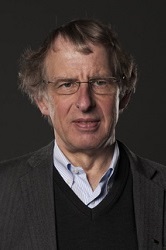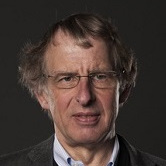Christof Wöll
Karlsruhe Institute of Technology, Germany
Monday, May 2nd 2022,16:00 s.t.
The talk will be given in hybrid mode.
You can join at:
Freihaus Hörsaal 7 (HS 7)
TU Freihaus, Yellow Area, 2nd floor
Wiedner Hauptstraße 8, 1040 Vienna
Or you can join the zoom meeting:
https://tuwien.zoom.us/j/92739417554?pwd=MlFkNjJxUjFkUUhPaUJmZ0ZnMjVOZz09
Meeting ID: 927 3941 7554 Passcode: X74b82XE

Materials Science in the Information Age
Materials Science has played an enormous role in human societies – and certainly will continue to do so. Achievements of condensed-matter physics, chemistry, and other fields of materials science are crucial for the energy, environment, health, mobility, IT sectors, etc. In contrast to former times, materials systems containing different types of materials to achieve multifunctionality are presently receiving increasing attention. Examples are batteries, medical implants, drug delivery, sensor devices needed for the Internet of Things, devices for quantum computing, and many more. Finding the right materials for a needed materials system is an enormous challenge since the number of possible materials is virtually unlimited. There are not enough atoms on planet earth to fabricate a repository containing even just a single copy of each possible molecule. Similar statements hold true for high entropy alloys (HEAs) and HEA-derived materials like high entropy oxides. Materials Science not only provided the material basis for the information age, semiconductor materials with high switching speeds and extremely high purities. The new tools emerging in this new era can in turn also be used to accelerate materials development. One example is the more efficient handling and storage of research data. Results from measurements and theoretical work produced every day in this field represent a gold mine of the 21st century, which at present is not exploited very efficiently. New tools are now becoming available that will make it possible to curate these data and to make them FAIR (Findable, Accessible, Interoperable, and Reusable) [1]. Such data are suited for sharing and exploration by machine learning (ML) and artificial-intelligence (AI) methods. Making data Findable and AI Ready (an alternative interpretation of the acronym) will drastically change the further development of Materials Science. In the talk, the problem will be described and chances, also with regard to developing synthesis routes for yet unknown materials [2], outlined.
References:
[1] FAIR data enabling new horizons for materials research
M. Scheffler, M. Aeschlimann, M. Albrecht, T. Bereau, H.-J. Bungartz, C. Felser, M. Greiner, A. Groß, C. T. Koch, K. Kremer, W. E. Nagel, M. Scheidgen, C. Wöll, C. Draxl; Nature, in print (to appear on April 28th, 2022).
[2] MOF Synthesis Prediction Enabled by Automatic Data Mining and Machine Learning
Y. Luo, S. Bag, O. Zaremba, A. Cierpka, J. Andreo, S. Wuttke, P. Friederich, M. Tsotsalas
Angew. Chemie, 2022, https://doi.org/10.1002/anie.202200242 .
Bio of Christoph Wöll
Christof Wöll studied physics at the University of Göttingen and received his PhD in 1987 at the Max-Planck-Institut of Dynamics and Self-Organization with Prof. Peter Toennies. After a postdoctoral time (1988 to 1989) at the IBM research laboratories, San Jose, USA he accepted a position equivalent to Assistant Professor at the University of Heidelberg at the Institute of Applied Physical Chemistry. After his habilitation he took over the chair for Physical Chemistry at the University of Bochum (until 2009). In 2000 he founded the collaborative research center SFB588 “Metal-substrate Interactions in Heterogeneous Catalysis”. Since 2009 he is the director of the Institute of Functional Interfaces at the Karlsruhe Institute of Technology.

